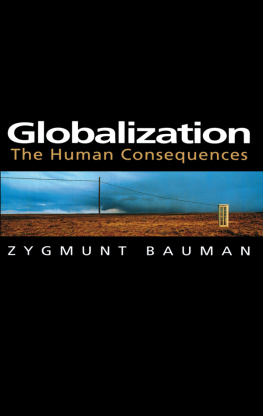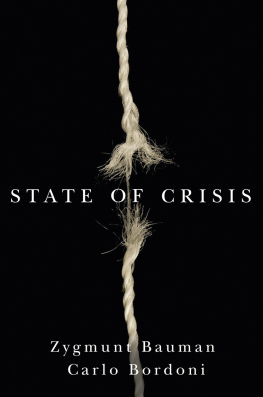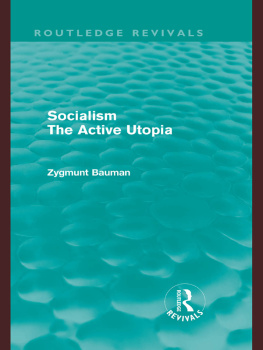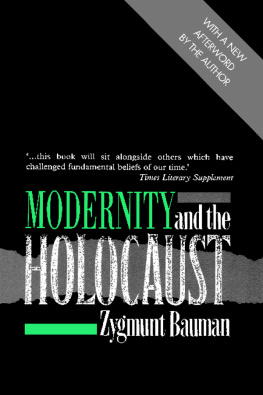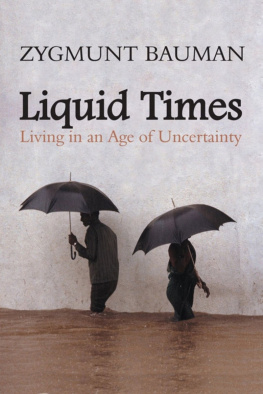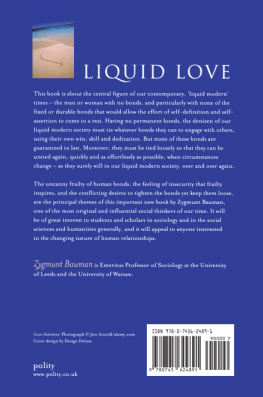The right of Zygmunt Bauman and Citlali Rovirosa-Madrazo to be identified as Authors of this Work has been asserted in accordance with the UK Copyright, Designs and Patents Act 1988.
All rights reserved. Except for the quotation of short passages for the purpose of criticism and review, no part of this publication may be reproduced, stored in a retrieval system, or transmitted, in any form or by any means, electronic, mechanical, photocopying, recording or otherwise, without the prior permission of the publisher.
A catalogue record for this book is available from the British Library.
The publisher has used its best endeavours to ensure that the URLs for external websites referred to in this book are correct and active at the time of going to press. However, the publisher has no responsibility for the websites and can make no guarantee that a site will remain live or that the content is or will remain appropriate.
Every effort has been made to trace all copyright holders, but if any have been inadvertently overlooked the publisher will be pleased to include any necessary credits in any subsequent reprint or edition.
Introduction
The first great recession of the last century, following the 1929 stock market crash, resulted in rival political systems and institutions that shaped a polarized world, with antagonistic forces fighting to establish different visions of economic development and, indeed, different visions of hegemonic domination; only to throw us back into decay when another recession, originating in Wall Street, lashed with the force of a tsunami in 2008.
This time, however, more challenging and decisive factors that no other civilization had known before were brought into the equation: unprecedented environmental threats with natural disasters attributed to climate change unprecedented levels of world poverty and an increase in the numbers of surplus population; extraordinary scientific and technological developments presenting our society with critical predicaments; and a decline in the moral and political systems that had given the institutions of modernity a degree of social cohesion and stability.
Based on the work of Zygmunt Bauman, this book considers in historical context the meaning of the first global financial crisis of our young century, establishing links and considering its causes, implications and some of the moral and political challenges ahead. What may be considered a final passage in the decline of the political institutions of modernity is addressed in this book, which seeks to explore matters beyond the mere economic phenomena of the Wall Street crash.
Financial slumps occur in historical contexts, in specific economic, political and moral discursive formations. The two largest financial downturns to have taken place in the space of two centuries have been associated with the long drawn out transition from modernity and with major historical developments from fascism and totalitarianism to neoliberalism , from the Holocaust, to the fall of the Berlin Wall, the decline of the ethnocratic state in Latin America and the war in Iraq. Both recessions took place in the context of huge political, moral, technological and military developments, which cannot be understood without looking into the archives of history and the ideological and economic formations that produced them.
Crisis can present us with opportunities to both modify and reflect on our situation, opportunities to try to understand how we got to the place where we are now and what we can do, if at all, to change our direction. It can represent a genuine opportunity for the production of new knowledge and the drawing of new epistemological frontiers , with implications for future lines of research and debate. If anything, this crisis should be a chance to step back and ask more questions, an occasion to review and challenge all our theoretical frameworks and explore some of our historical and mental caves with more appropriate analytical and epistemological tools, hoping that we can identify and learn from our historical candidness. It is not good enough to try to look at the immediate economic and financial causes and effects of the financial collapse of the autumn of 2008: a thorough check-up is in order; a review of the framework that shaped our approach to the economy, assessing at todays historical crossroads which institutions will survive, and which may indeed become redundant or extinct.
The colossal crash of Wall Street in 2008, and the subsequent collapse of the banking sector were not going to signal the fall of capitalism, as Bauman sharply tells us in this book, and as the world leaders showed when they gathered at the G20 summit in Washington shortly after the Wall Street disaster and ratified their commitment to the dogma of the free market economy, proceeding to transform the state into a gigantic insurance company issuing insurance policies for the banks and Wall Street. Indeed, as Bauman argues here, cooperation between state and market is, under capitalism, a rule; conflict between them, if it ever surfaces, is an exception, and the latest developments only confirmed this rule.
The global financial downturn of 2008 and the inability or unwillingness of governments to regulate the financial and banking sectors a characteristic feature of what Bauman regards as liquid times , sprang recession upon us, sending us into uncharted territories. In early 2009, the International Labour Organization estimated that global unemployment could increase to a staggering 50 million. The World Bank, in its economic forecast for 2009,
All these figures represented the broad picture in rather conservative numbers if one is prepared, that is, to accept cold statistics and cold numbers as the best means of measuring and quantifying human misery, and human waste, but, as our conversations in the book show, there is more to this than simply numbers. The economic downturn, along with the subsequent plans of governments around the world to collectivize private financial debt, also revealed intricate linguistic constructions and complex discursive developments. Thus, in recent times, the language of rights has changed: citizens have become customers; passengers and hospital patients have become clients; poverty has become criminalized as Bauman shows throughout his work and extreme poverty has become a pathological condition rather than a reflection of structural injustice a pathological dysfunction of those who are poor, rather than the structural dysfunction of an economic system that generates and reproduces inequality;
These financial developments and the crisis of the economic orthodoxy of the late twentieth century occurred as part of historical processes including the rise and fall of the postwar Keynesian welfare state, the rise and fall of the nation-state, and democracy, all of which Bauman has examined in depth in various publications and revisited in our conversations. There are, in Baumans view, many instances in which our perceptions of both the state and its reality have changed, leading the consumer markets to slip into the role vacated by the state, a phenomenon that has become clearer since President Ronald Reagan in the US and Prime Minister Margaret Thatcher in the UK imposed privatization and deregulation policies with catastrophic consequences worldwide, consequences which led up to the 2008 crash. Another example of these dramatic changes concerns the mutations of the welfare state: the defining purpose of the agencies created for dealing with poverty is no longer, says Bauman, keeping the poor in good shape. Indeed policing the poor is the new task of the state agencies that run something like a ghetto without walls, a camp without barbed wire (though densely packed with watch towers). Such are some of the themes we address herein as we embark upon an open, frank and interdisciplinary exchange, giving depth to the latest developments, rather than isolating them in a narrow and reductionist economic perspective.



